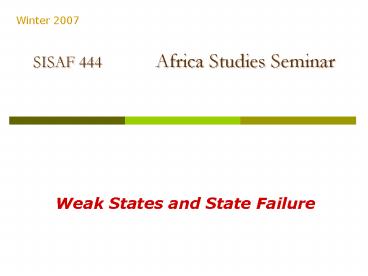SISAF 444 Africa Studies Seminar - PowerPoint PPT Presentation
1 / 30
Title:
SISAF 444 Africa Studies Seminar
Description:
State scope and state strength. Essence of 'stateness': enforcement. Scope of ... State scope and state strength. The scope of the state. Intermediate functions ... – PowerPoint PPT presentation
Number of Views:56
Avg rating:3.0/5.0
Title: SISAF 444 Africa Studies Seminar
1
SISAF 444 Africa Studies Seminar
Winter 2007
- Weak States and State Failure
2
Three Development Paradigms
- Statism (a big government)
- State-led development, industrialization,
import-substitution - Neo-liberalism (a small government)
- Washington consensus, stabilization,
liberalization, structural adjustment,
conditionality - State-building (the right government)
- Relationships between state, market and
non-state/non-market institutions (e.g. civil
society), - Emphasis on governance, incentives and wider
economic/political participation
3
Three Development Paradigms
- Statism (a big government)
- State-led development, industrialization,
import-substitution - Neo-liberalism (a small government)
- Washington consensus, stabilization,
liberalization, structural adjustment,
conditionality - State-building (the right government)
- Relationships between state, market and
non-state/non-market institutions (e.g. civil
society), - Emphasis on governance, incentives and wider
economic/political participation
Fukuyamas emphasis
4
States and societies
- African states
- weak (low capacity, unable to project power
effectively, unable to achieve stated goals)
5
Ellis, How to Rebuild Africa
- Dysfunctional states
- Cannot guarantee law and order throughout their
territory - Cannot fulfill many international obligations
6
State scope and state strength
- Essence of stateness enforcement
- Scope of state activities
- Strength of state power
7
State scope and state strength
- The scope of the state
- Minimal functions
- Intermediate functions
- Activist functions
8
State scope and state strength
- The scope of the state
- Minimal functions
- Pure public goods
- Defense, law and order, property rights,
macroeconomic stabilization, public health - Improving equity
- Pro-poor policies/transfers
9
State scope and state strength
- The scope of the state
- Intermediate functions
- Managing externalities
- Regulation (antitrust, competition policy)
- Social insurance/social welfare
10
State scope and state strength
- The scope of the state
- Activist functions
- Industrial policy (protection, subsidies)
- Wealth redistribution
11
State scope and state strength
- The scope of the state
- Minimal functions
- Intermediate functions
- Activist functions
Less discretionary policy
More discretionary policy
12
State scope and state strength
- The scope of the state
- Minimal functions
- Intermediate functions
- Activist functions
Less scope for rent-seeking
More scope for rent-seeking
13
State scope and state strength
- The strength of the state
- How efficient is the state?
- Can the state achieve its goals?
- Can the state enforce policies?
14
State scope and state strength
Strength of state institutions
I.
II.
III.
IV.
Scope of state functions
15
State scope and state strength
Strength of state institutions
W. Europe
Japan
U.S.
USSR
I.
II.
Brazil
III.
IV.
Sierra Leone
Scope of state functions
16
State scope and state strength
Strength of state institutions
Europe since 1600
I.
II.
III.
IV.
Scope of state functions
17
State scope and state strength
Strength of state institutions
U.S. since 1800
I.
II.
III.
IV.
Scope of state functions
18
State scope and state strength
Strength of state institutions
I.
II.
Russia since 1990
III.
IV.
Scope of state functions
19
State scope and state strength
Strength of state institutions
I.
II.
III.
IV.
Africa since 1980
Scope of state functions
20
The Roadblock State
21
State scope and state strength
Strength of state institutions
I.
II.
Desirable reform path?
III.
IV.
Scope of state functions
22
State scope and state strength
Strength of state institutions
Classical Liberalism
Welfare State
Developmental State
Totalitarianism
Patrimonial State
Failed State
Scope of state functions
23
What kinds of states are there?
- Modern States
- sovereignty, security, national self-interest,
war - (U.S., Russia, China)
- Post-Modern States
- dilution of sovereignty, co-operation, peace
- (Germany, France)
- Pre-Modern States
- Weak or failed states, internal conflict,
predation - (DR Congo, Sudan, Somalia, Zimbabwe)
- From Robert Cooper, The Breaking of Nations
(2003)
24
Failed States Index 2006
- Mounting Demographic Pressures
- Refugees, Internally Displaced Persons
- Legacy of Group Grievances
- Sustained Human Flight
- Group-based Uneven Development
- Severe Economic Decline
- Criminalization/De-legitimization of the State
- Deterioration of Public Services
- Arbitrary Law
- State within a state Security Apparatus
- Factionalized Elites
- External Intervention
Foreign Policy, May/June 2006
25
Red Critical Orange In Danger Yellow
Borderline
Failed State Index 2006 (Foreign Policy,
May/June 2006)
26
Red Critical Orange In Danger Yellow
Borderline
Failed State Index 2006 (Foreign Policy,
May/June 2006)
27
Red Critical Orange In Danger Yellow
Borderline
Failed State Index 2006 (Foreign Policy,
May/June 2006)
28
(No Transcript)
29
Median Age and State Failure
30
Corruption and State Failure































